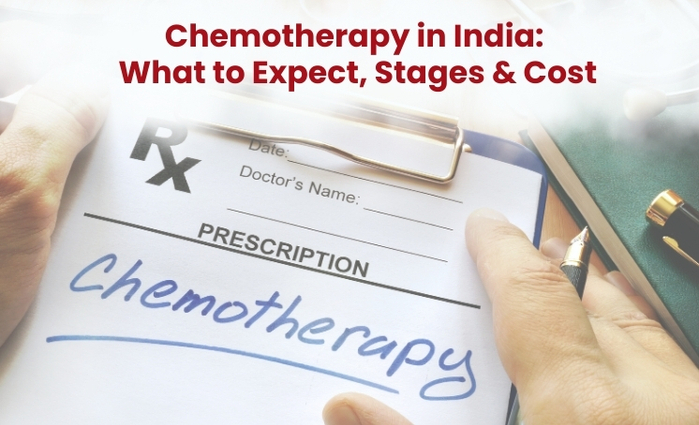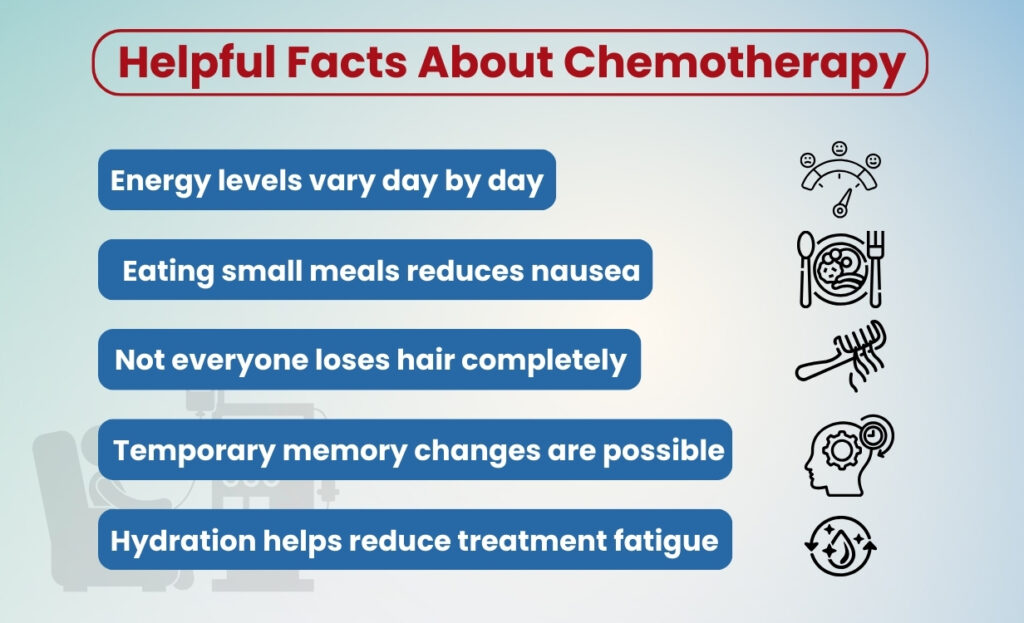A Complete Guide to Chemotherapy: Treatment Stages, Aftercare Tips, and Cost in India

More than half of all cancer patients undergo chemotherapy at some point in their treatment journey. Yet most of the patients still wonder what to expect during chemotherapy on a day to day basis.
Being told you need chemotherapy can raise many questions. What will the treatment feel like? How will it affect your daily life? Will you be able to recover comfortably? These are the thoughts almost every patient has when they hear the word “chemotherapy.”
This blog gives you a clear, step-by-step guide to the chemotherapy experience. You’ll learn about the chemotherapy treatment stages, practical chemotherapy aftercare tips, and the factors that shape the chemotherapy cost in India.
What to Expect During Chemotherapy
Chemotherapy uses strong medicines to destroy cancer cells or stop them from spreading. While the treatment is effective, it can affect healthy cells too, which is why certain side effects may appear.
Here’s what you can usually expect:
- During the session: Chemotherapy may be given as an intravenous infusion, injection, or oral tablets. Sessions can last from 30 minutes to a few hours depending on the drug.
- Physical side effects: Tiredness, nausea, vomiting, hair loss, loss of appetite, and increased risk of infections are common. These vary from person to person. Patients are usually encouraged to relax, some bring a book, music, or a companion to make the time more comfortable.
- Physical side effects: Tiredness, nausea, vomiting, hair loss, loss of appetite, and increased risk of infections are common, though they vary from person to person. Doctors prescribe supportive medicines to reduce these effects.
- Day-to-day routine: Many patients can continue light daily activities, while others may need more rest after sessions. Listening to your body and pacing yourself is important.
- Emotional aspects: Anxiety, fear, and mood changes are natural. Counseling and family support help ease these feelings.
- Follow-ups: Doctors regularly monitor your blood counts, organ health, and response to treatment to ensure safety and adjust the plan accordingly.
Chemotherapy Treatment Stages
Every patient’s journey is unique, but most chemotherapy follows three main stages:
- Pre-treatment evaluation
- Doctors advise blood tests, scans, and sometimes a biopsy to check overall health.
- Heart, kidney, and liver function are also assessed.
- A personalized chemotherapy treatment plan is created based on cancer type, stage, and your fitness level.
- During treatment
- Chemotherapy drugs are given in cycles, usually every 1-3 weeks.
- Each cycle has treatment days followed by rest days to allow the body to recover.
- You may go home the same day or stay shortly at the hospital if required.
- Doctors and nurses closely monitor you for immediate reactions during each session..
- Post-treatment care
- After each cycle, the body needs time to recover.
- Blood counts are checked before the next cycle, and side effects are managed with medicines, diet adjustments, and rest.
- Imaging tests may be done after several cycles to evaluate how well the treatment is working.
- Based on your progress, doctors decide whether to continue, adjust, or change the treatment plan.
Chemotherapy Aftercare Tips
Life after each chemo session requires extra care. Following these simple daily habits can make recovery smoother and help reduce side effects:
- Nutrition: Eat small, frequent meals. Focus on fruits, vegetables, lean protein, and whole grains. Avoid spicy or oily food if nausea occurs. Cold or bland foods may sometimes feel easier to eat. If appetite is low, try high-calorie smoothies or soups for energy.
- Hydration: Drink plenty of water to flush out medicines and reduce fatigue. Coconut water, fresh juices, and clear soups can also help if plain water feels difficult to consume.
- Rest and activity: Take short naps when you feel tired, but also try light activities like gentle stretching or slow walks to maintain strength and circulation. Balance is key, listen to your body.
- Hygiene: Wash hands often, use a soft toothbrush, and avoid crowded places to reduce infection risk. Keep nails trimmed and skin moisturized to prevent cuts or dryness that could become entry points for infection.
- Emotional care: Relaxation techniques such as meditation, deep breathing, or light yoga can calm the mind. Counseling or support groups can also provide comfort and reduce anxiety.
- Caregiver role: Family members should watch for warning signs like fever, bleeding, severe vomiting, or sudden shortness of breath and inform the doctor immediately. Keeping a simple diary of symptoms can help track progress between visits.
Chemotherapy Cost in India
The chemotherapy cost in India can vary based on several factors, including:
- Type of drug used (generic vs targeted therapy).
- Number of cycles prescribed.
- Hospital facilities.
- Duration of hospital stay if admitted.
Here’s a general cost overview:
| Factors | Estimated Cost Range |
|---|---|
| Generic chemotherapy drugs | ₹15,000 – ₹40,000 |
| Targeted therapy drugs | ₹50,000 – ₹1,00,000+ |
| Facilities | Varies depending on services and room type |
On average, each chemotherapy cycle in India costs ₹15,000 to ₹1,00,000, depending on the above factors.
At PSRI Hospital known as the best hospital in Delhi for Chemotherapy and comprehensive cancer care patients benefit from transparent pricing and the convenience of cashless treatment through insurance partnerships. This allows families to focus on recovery, while the hospital team coordinates directly with insurers to handle the financial process smoothly.
Why Choose PSRI Hospital for Chemotherapy Treatment
At PSRI Hospital, a trusted name in Delhi for cancer care, patients benefit from a combination of experience, accreditation, technology, and compassionate support:
- Bed Capacity & Infrastructure: With a strength of 201 beds, including dedicated inpatient facilities and 24×7 blood bank services, we ensure timely and coordinated care whenever you need it.
- Advanced Oncology Facilities: We operate a dedicated Oncology Day-Care unit and have a team of nine senior cancer specialists across medical, surgical, radiation, and hematology oncology.
- Trusted by Patient: Over 2,000 new cancer patients choose PSRI every month, reflecting the trust and confidence families place in our expertise.
- Accreditations & Quality Outcomes: PSRI is NABH and NABL accredited and backed by JK Organisation, ensuring adherence to rigorous safety and care protocols.
- Supportive Financial Care: With capped chemotherapy prices and complete treatment packages that can help families save up to 25%, we also provide a dedicated Finance Desk to simplify insurance processes and cashless treatment options.
Book Your Appointment for Chemotherapy at PSRI Hospital, Delhi Today!
Chemotherapy may sound overwhelming, but with the right care, it becomes a safe and effective step toward recovery. At PSRI Hospital, Delhi, our NABH-accredited oncology centre is led by senior oncologists and supported by advanced diagnostic labs, 24×7 emergency care, and personalized treatment plans.
Whether you’re starting your first cycle or seeking a second opinion, we provide:
- Clear treatment timelines and cycle planning.
- Transparent chemotherapy cost in India with insurance and cashless options.
- Dedicated aftercare support to manage side effects and recovery.
- Compassionate care teams available round-the-clock.
Want expert, personalized guidance on chemotherapy treatment? Book a consultation with PSRI’s oncology specialists today.
Call/WhatsApp: +91 84 84 84 84 17
FAQs
Q1. Is chemotherapy painful?
Ans. The treatment itself is usually not painful, though some may feel discomfort from the IV line or temporary side effects like nausea and fatigue.
Q2. How long does one chemotherapy session take?
Ans. Depending on the drug, sessions can last from half an hour to several hours. Some treatments may require an overnight stay.
Q3. How many chemotherapy cycles will I need?
Ans. This depends on cancer type, stage, and response. Most patients undergo multiple cycles spread over months.
Q4. Can I continue working during chemotherapy?
Ans. Many patients continue light work, but fatigue may require rest days. Discuss with your doctor based on your treatment plan.
Q5. What foods should I eat after chemotherapy?
Ans. Focus on easy-to-digest, nutrient-rich foods like soups, fruits, steamed vegetables, and whole grains. Avoid raw or unhygienic food to reduce infection risk.

 Book An Appointment
Book An Appointment Virtual Consultation
Virtual Consultation






